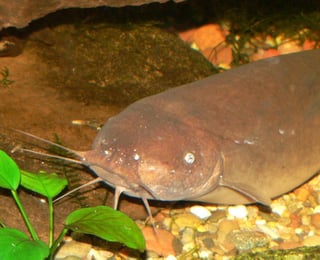Electric catfish is the common name for the catfish that belong to the Malapteruridae family. Several species of this family can produce an electric shock of up to 350 volts. To do this the use electric organ known as electroplaques. This electrogenic organ is derived from anterior body musculature and lines the body cavity. Electric catfish are found in tropical Africa and the Nile River. Some species feed primarily on other fish, incapacitating their prey with electric discharges. However the majority are generalist bottom feeders. The largest species can grow to up four feet long.

(Image courtesy of Wikimedia Commons)
Michigan State University (MSU) scientists were recently awarded $1.5 million in research funding from the National Science Foundation to study these amazing creatures that have served as a model biology system in neurological studies for centuries. Electric fish have already provided insights into bioelectrogenesis, the ability to produce electric fields outside the body. They have also helped improve our understanding of the molecular structure of the synapse and the brain circuitry underlying complex behavior.
Now MSU researchers hope to make a new type of model for biology by utilizing the power of the CRISPR/Cas9 gene editing in electric fish. Lead investigator Jason Gallant believes they could be the model organisms for new studies that could help decode the function of their genomes. In an article for MSU Today Dr. Gallant stated, “Making this connection is an important goal across disciplines of biology, and we want to develop a robust, accessible and easily transferable gene manipulation toolbox to allow the electric fish model to help achieve that goal,” Gallant said. “These all-purpose tools then can be applied to a full range of questions under investigation, regardless of a researcher’s background.”
Gallant’s team will use the CRISPR/Cas9 gene editing technologies to generate mutant lines of transgenic electric fish. Such mutant models of mice, zebrafish and fruit flies have served as a critical step for many genetic and medicinal advances.
Gallant’s team is composed of researchers from several universities including the University of Oklahoma. With this grant funding they plan to create large colonies of electric fish at MSU and the University of Oklahoma. Then utilizing these colonies, they will develop new techniques for “knocking down” gene function. Gene knockdown is the process of reducing the expression of one or more of an organism's genes. They will be using morpholinos, which block access of other molecules to small specific sequences of the base-pairing surfaces of RNA, and introducing foreign genetic material using retroviruses to achieve gene knockdown.
Gallant went on to say in the article that, “Developing genetic tools for monitoring and manipulating gene activity in electric fish would revolutionize the field and enable a wave of new studies that exploit the unique features of these organisms for addressing central questions in biology at a level of resolution not possible in other vertebrate systems.”
MSU Researchers to Meet with Laboratory Equipment Suppliers at Bioresearch Product Faire:
The 17th Annual BioResearch Product Faire™ event at Michigan State University will be held on Wednesday, August 2nd, 2017. This is an excellent opportunity for lab suppliers to meet face to face with life science researchers and educate them about current lab or chemical supply products. Call us at 530-272-6675 or click on the link below to learn how to increase your scientific sales in 2017.
Life science professionals are invited to attend the annual on campus biotechnology trade show for free. Click the button below for additional information or to pre-register.
While in the area, lab suppliers may also want to consider exhibiting the following day at the annual BioResearch Product Faire at the University of Michigan, Ann Arbor on Thursday, August 3rd, 2017.




